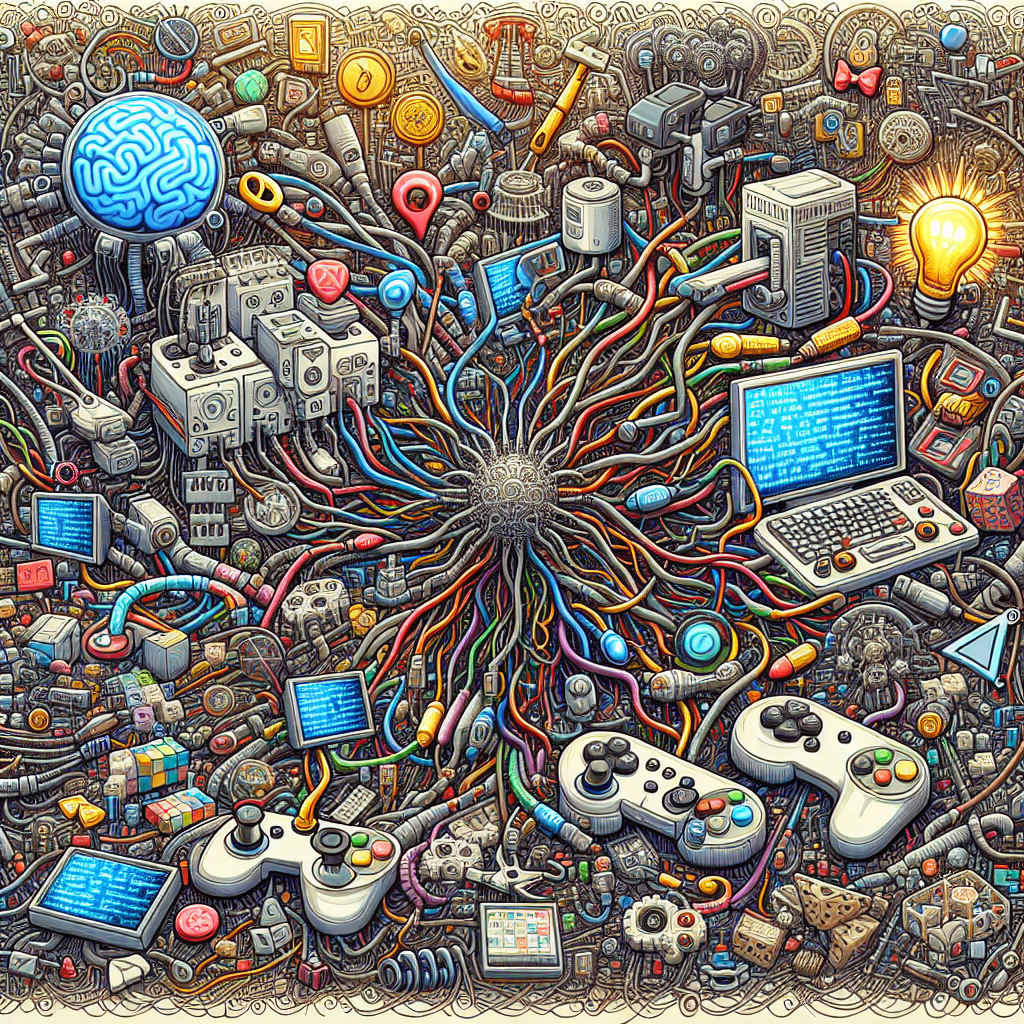
Artificial Intelligence (AI) has significantly transformed diverse industries, with call centers undoubtedly among the most affected sectors. In particular, AI in the context of gamification is revolutionizing how call center agents are engaged and their performances boosted. This unprecedented change is the upshot of integrating AI into call center gamification, giving rise to a dynamic, immersive, and efficacious environment for agents.

One could say AI gamification in call centers is akin to playing a video game where achievements are unlocked upon meeting certain objectives. However, in this context, those objectives are synonymous with key performance indicators (KPIs) individual agents must attain. These could range from answering customer queries promptly, keeping hold time to a minimum, to maintaining a high customer satisfaction rate. By gamifying these performance metrics, companies are fostering a more engaging and competitive environment that motivates agents to exceed their goals.
What's more, this integration of AI into gamification is strikingly innovative because automation allows for real-time tracking and analytics. This means performance metrics can be evaluated on the fly, with customizable feedback and rewards offered almost instantaneously. Metrics are no longer suffocated by periodic reviews; instead, they breathe in an environment of continuous monitoring and evaluation, resulting in dramatically enhanced performance and engagement levels among call center agents.
Whilst the implementation of AI gamification in call centers is steadily gaining traction, apprehensions and misconceptions about its complexities, cost, and risks continue to persist. The following sections aim to demystify such concerns and provide a comprehensive understanding of the realistic potential AI gamification holds in augmenting call center productivity and agent engagement.
When striving for peak performance and engagement in call centers, gamification techniques have proven to be highly effective. However, the advent of artificial intelligence (AI) has added a dynamic touch, bringing in remarkable transformational elements. There are three core elements of AI-driven gamification that are leading the new wave in call center optimization: real-time performance tracking, personalized challenges, and adaptive learning systems.
Real-time performance tracking is a revolutionary tool that AI brings to call center gamification. It allows the seamless monitoring and management of agent performance. AI algorithms, recording every interaction, provide metrics almost immediately. This instant, accurate data keeps managers aware and agents motivated. It paves the way for implementing reward systems, helping to boost engagement. A study emphasizes how this technology has notably enhanced efficiency in call centers.
The incorporation of personalized challenges is another prominent feature of AI-powered gamification. Traditional one-size-fits-all challenges have evolved into personalized tasks tailored to match individual skills and productivity levels. AI performs detailed analysis of agent performance, learning their strengths and weaknesses. Based on the analysis, it generates challenges that push the agents towards progressive improvement. The call centre gamification model entails how such dynamics can play a pivotal role in enhancing the overall team performance.
Last but not least, adaptive learning systems constitute a crucial part of AI-driven gamification. These systems understand each agent’s learning pace, capability, and pattern, and adapt the training materials accordingly. Adaptive learning ensures that the training process becomes an engaging, personalized experience. Intel's AI and analytics report elucidates how this approach maximizes efficiency and reduces turnover rates.
In conclusion, AI's assimilation into call center gamification adds layers of transparency, customization, and adaptiveness, driving improved agent performance and engagement. These core elements working in unison not only transform the work environment but also contribute to the overall growth of the organization.
In the world of customer service, leveraging AI in call center gamification has inspired numerous success stories. With the prime focus on boosting productivity, companies are employing gamification with AI enhancements to elevate agent performance and engagement levels. Two prominent case studies illuminate the way this innovative tech approach can cause a paradigm shift in the call center environment.

Let's first delve into the story of Liveops, a virtual call center company. They implemented AI-based gamification to optimize their agent performance. The strategy was simple but effective: highlight thoughtful competition and incentivize professional growth. Agents were ranked based on customer service ratings, maintaining a real-time leaderboard fuelled by AI algorithms. The results? A tremendous increase in agent engagement, customer satisfaction score, and call quality.
The second example comes from Ameyo, an AI-based contact center software provider. Ameyo utilized AI-driven gamification with its Fusion CX platform addressing the unique challenges of its client, a fintech company. Using sophisticated machine learning, Ameyo analyzed agent behavior patterns, integrating those insights directly into their gamified system. This made individual agent targets more personalized and realistic. The outcome? Higher engagement rates, increased productivity, and a proven boost in conversion rates.
These case studies show that the combined power of AI and gamification indeed transforms call center performance indicators while fostering a more engaged, satisfied workforce. By recognizing the tastes and styles of individual agents, AI-powered gamification strategies can refine goals to be more personal and achievable, consequently enhancing productivity.
In a nutshell, the utilization of AI in call center gamification has the potential to rewrite the future of customer service by reinforcing agent-centric strategies. With a keen understanding of individual capabilities and the use of AI to customize agent experiences, companies can not only improve their KPIs but also inspire a more committed, motivated, and content workforce.
In the evolving world of call center operations, one technological advancement that is making a significant impact is the integration of Artificial Intelligence (AI) in gamification strategies. AI-driven gamification is proving to be a game-changer, contributing to enhanced agent motivation, performance improvement, and greater job satisfaction.
Firstly, gamified strategies evoke a competitive spirit and active engagement among agents. Agents strive to score higher points, step up their leaderboard rankings, and earn rewards, providing a fun, competitive environment that helps alleviate the stress associated with monotony and high-pressure tasks. Implementing AI in this setup can further magnify the impacts.
AI analytics can track each agent's performance, providing tailored feedback and setting personalized goals based on individual abilities. This customized engagement help agents better understand their areas of strength and improvement, promoting self-growth and higher motivation levels.
Next, AI-driven gamification can directly improve concrete performance metrics. Using AI monitoring and data analysis, managers can identify sticking points in customer-agent interactions, areas that need skill improvement, and guide targeted training efforts. Not only does this streamline call center operations but it also enhances the overall customer service experience.
Furthermore, AI can automate many cumbersome administrative tasks associated with performance management, such as manual data entry and tracking, paving the way for managers to focus more on strategic tasks.
Lastly, an often overlooked yet significant benefit is the potential increase in job satisfaction. In direct correlation with the earlier points, a well engaged and motivated agent, who receives tailored guidance and feels a sense of achievement in their work, is more likely to find satisfaction in their role.
To sum up, the application of AI in call center gamification brings forth a plethora of benefits that not only affect call center performance but also, critically, contribute to agent engagement and satisfaction, thereby fostering an overall healthier working environment.
Integrating AI and gamification into call center environments can bring about significant improvements in agent performance and engagement. However, it is not without its own set of challenges. Potential obstacles must be acknowledged and addressed to ensure seamless implementation and maximum benefit.

Privacy stands as a major concern when implementing AI in call centers. Ensuring that AI systems respect customer confidentiality and comply with data protection regulations such as GDPR is critical. Strategies must be developed to anonymize personal data and safeguard sensitive information.
Continuous AI training is another notable challenge. AI systems need access to vast amounts of data to learn and improve. Ongoing data feed and regular system updates are necessary to ensure the AI functionalities evolve and adapt to changing needs.
Fairness in competitive elements is a key consideration. Gamification often involves leaderboards, achievements, and rewards. Balancing healthy competition with fair play is crucial. AI systems must be structured to recognize and reward consistent effort and improvement, instead of creating limiting hierarchies.
To successfully overcome these challenges, organizations should fully comprehend the complexity of adopting AI and plan for ongoing training, data management, and a fair reward system. In doing so, they can ensure that AI gamification positively impacts their call center’s performance and agent engagement.
The future of AI in call center gamification holds immense potential for revolutionizing both agent performance and engagement. AI-enabled gamification is set to become an integral part of workforce optimization strategies being enabled by several emerging trends and ongoing research.
A noteworthy trend is the amalgamation of next-gen artificial intelligence technologies with existing gamification engines. This trend amplifies and individualizes the gamification experience for each agent, thereby ensuring a more robust engagement. Gartner defines gamification as the use of game mechanics and behaviors in non-gaming contexts, which can be enhanced significantly with the application of AI.
Ongoing research in areas like Natural Language Processing (NLP) and sentiment analysis are set to fundamentally transform the landscape of AI in call center gamification. NLP can be utilized to interpret an agent's communication style and apply game mechanics that can improve their performance.
Looking ahead, call center gamification might fully exploit the capabilities of AI-powered predictive analytics to further personalize tasks, challenges, and rewards, thereby increasing agent motivation. AI-based predictive analytics are being explored to forecast agent behavior, which can help in designing appropriate gamification strategies.
Moreover, the use of real-time analytics will become mainstream, allowing instant feedback and gratification for agents. Consequently, this will not only impact their immediate performance but also aid in overall skills development. The prospects of harnessing AI for call center gamification are boundless, promising a future where agent engagement and performance reach new heights.
Start your free trial for My AI Front Desk today, it takes minutes to setup!








